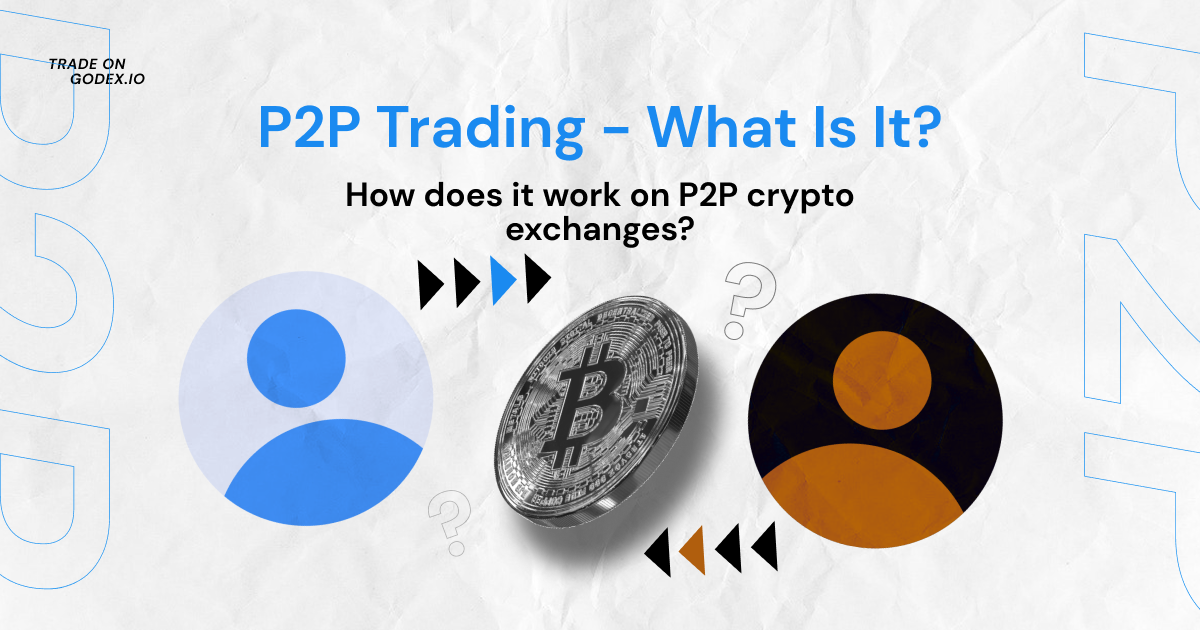Table of Contents
P2P trading offers a decentralised approach to buying and selling digital assets. As more individuals delve into the world of cryptocurrencies, understanding the nuances of peer-to-peer transactions becomes essential. Dive into this simple guide tailored for both seasoned traders and newcomers, and uncover the world of P2P trading in crypto
Peer-to-peer (P2P) trading explained
What is p2p trading? It involves individuals directly exchanging digital currencies without the involvement of an intermediary or central entity. This stands in contrast to using centralised exchanges (CEXs), where direct transactions with other participants aren’t possible.
On a CEX, the platform employs graphs and market data collectors to sense prevailing market rates, influencing decisions on whether to purchase, sell, or retain your digital assets. When you decide to trade, the platform integrates your request into its trading ledger and manages the deal for you.
The nature of your trading request can lead to factors like price drift, which might result in not securing your desired rate. Conversely, peer to peer trading empowers you with more control over the transaction terms, price, and selection of your trading partner.
What makes a P2P crypto exchange efficient?
The emergence of P2P crypto trading exchanges differentiates these platforms from other types of bitcoin trading in a variety of respects. Many users are drawn to P2P systems because of particular advantages that set them apart from competing options. P2P cryptocurrency trading has a number of distinct advantages over its competitors, including the following:
- There are no fees for transactions at all
- Pricing that can be adjusted
- Increased discretion and privacy
- The absence of any kind of middleman.
How does peer-to-peer cryptocurrency trading function?
P2P trading can be linked to a connector system, pairing potential buyers and sellers for trades at speed. Unlike some traditional platforms, these P2P venues often skip transaction charges and advocate for users to manage their own digital assets in personal wallets.
Think of P2P trading crypto platforms as akin to marketplaces such as Facebook Marketplace or Gumtree, but for cryptocurrency enthusiasts. Users can sift through various crypto listings or even create their own.
User reviews and ratings frequently serve to reinforce safety within this domain. This means you have the opportunity to vet the credibility of asset traders on the network before diving into a transaction.
To clarify, consider this analogy:
Let’s say Tom is interested in buying 10 Bitcoins, while Ann is looking to sell 10 Bitcoins. A platform that facilitates peer-to-peer transactions acts as a link between the two parties, enabling them to do business directly with one another.
A computer-generated intelligent contract Escrow is in charge of ensuring that the terms of the deal are kept secure. This indicates that Anna’s 10 BTC will remain in escrow until the terms have been satisfied. When the escrow service receives confirmation from Anna that Tom has sent the money to her, it will release the bitcoins into Tom’s digital wallet.
In the context of traditional banking, this procedure would often be overseen by financial organisations such as banks and other similar establishments. These organisations are accountable for the protection of funds, the transfer of funds, the verification of transactions, and the documentation of transactions.
In person-to-person (P2P) trade, there is no need for middlemen because all participants trade directly with one another. The system relies on methods of consensus in order to guarantee the legitimacy of transactions and avoid double spending. As a consequence of this, every member in the network has access to a distributed ledger that records all of the transactions that occur between peers.
Benefits of P2P cryptocurrency trading
Here are some standout advantages to engaging in peer to peer crypto trading:
Gateway to the International Arena
Participating in peer-to-peer (P2P) crypto trading provides access to a large number of traders located all over the world. It gives you the opportunity to interact with peers from all over the world. In addition, peer-to-peer networks continue to shine as a guiding light even in regions where cryptocurrency is subject to regulations. This is primarily due to the fact that they do not fall under the jurisdiction of centralised authority.
Diverse Payment Options
P2P trading platforms hold a huge variety of payment alternatives, each of which may be customised to suit the preferences of individual traders. This affords you the luxury of choosing a transaction method that is most suitable for your requirements, allowing you more flexibility than conventional centralised exchanges do.
Economical Transaction Charges
When using P2P platforms, having direct user-to-user interactions typically results in lower overhead expenses. Many of these platforms advertise extremely low prices, and some of them even do not charge any fees at all.
Robust Trade Safety Measures
Safety is paramount in P2P trading. Most platforms incorporate escrow services, temporarily holding assets until both trading parties are satisfied. Coupled with encryption and dual-authentication procedures, these platforms prioritize secure trading experiences.
Disadvantages of P2P cryptocurrency trading
Here are some challenges associated with P2P trading:
Potential for Reduced Liquidity
Lesser-known P2P platforms may occasionally grapple with liquidity issues. Operating within such a market often extends the trade completion time. Furthermore, this can sway currency valuations. However, opting for a well-established P2P trading and exchange can help navigate this challenge.
Delays in Transaction Time
While P2P trades can be swift once both parties align on the terms, any delay or disagreement from one party can elongate the trading process.
Exposure to Scam Risks
One of the predominant concerns in P2P trading cryptocurrency is its vulnerability to fraudulent activities. It’s imperative to adopt stringent verification procedures and rely on reputable trading mechanisms to mitigate these risks.
It’s worth noting that transactions spanning multiple platforms can heighten scam risks. Always ensure thorough verification, and be patient and meticulous when engaging in P2P exchanges.
How Do People Benefit from Trading P2P?
Peer to peer trading crypto is gaining popularity as an alternative to traditional exchanges due to the fact that it allows users to circumvent the influence of a centralised pricing authority. This frequently results in more competitive rates as well as reduced transaction costs, which has the potential to increase profit margins for cryptocurrency dealers.
In addition, peer-to-peer (P2P) platforms usually have better liquidity than traditional exchanges because of the large number of traders that use them. This makes it easier to find a buyer or seller for any particular cryptocurrency. However, before deciding on a platform, it is absolutely necessary to carry out exhaustive research, and it is as important to exercise caution in conducting business online.
P2P cryptocurrency trading has the potential to function as an effective market for cryptocurrency exchanges if it is subjected to careful screening and participants make decisions based on accurate information.
If you are interested in the possibility of profiting from fluctuations in the market or if you are longing for increased autonomy in your transactions involving digital currency, you should give some thought to the developing P2P market.
FAQ
Are there any risks involved in P2P crypto trading?
Traders ought to be aware of these potential risks: deceptive practices, insufficient oversight, unpredictable price fluctuations, and the absence of conflict resolution mechanisms.
Can I trade fiat currency for cryptocurrencies through P2P crypto trading?
Fiat currency trading involves buying, selling, or exchanging cryptocurrencies using traditional money. While many platforms today don’t facilitate the straight acquisition of Bitcoin or other digital assets with fiat, buyers often transact directly with sellers who possess the desired cryptocurrency. As these crypto acquisitions happen between participants outside of standard exchanges, this form of trading is often referred to as “peer-to-peer” or “OTC transactions”.
What precautions should I take when engaging in P2P crypto trading?
Traders, while being mindful of the highlighted risks, should also heed the subsequent advice:
- Authenticate the vendor.
- Stay cautious of inflated rates.
- Review the seller’s reputation and client reviews.
- Avoid transactions off the designated platform.
- Be alert for counterfeit transfers.
Start a Cryptocurrency exchange
Try our crypto exchange platform
Disclaimer: Please keep in mind that the content of this article is not financial or investing advice. The information provided is the author’s opinion only and should not be considered as direct recommendations for trading or investment. Any article reader or website visitor should consider multiple viewpoints and become familiar with all local regulations before cryptocurrency investment. We do not make any warranties about reliability and accuracy of this information.
 Peter Moore
Peter Moore 
Read more
Ripple (XRP) price has been widely discussed by the cryptocurrency community since it has gained public interest in 2017, even though it was founded by Chris Larsen and Jed McCaleb years before. The platform offers innovative blockchain solutions for the banking sector and has the potential to disrupt the whole finance industry. In recent years, […]
In this article we will talk about Ripple (XRP) and its price prediction. What is Ripple (XRP) Ripple is a San Francisco-based startup that was launched in 2012 by Ripple Labs as a global network both for cross-currency and gross payments. Ripple history began in 2004 with the discussions around the digital coin in the […]
You may well think that an article dedicated to a Tether price prediction or the Tether price in general is a little bit strange — it is a stablecoin after all. However, the price of Tether does fluctuate significantly, although it is nowhere near as volatile as non-stablecoin cryptos. This means that staying up to […]
In the article we share our vision at Zcash cryptocurrency main features and add several price predictions. As cryptocurrencies gain global acceptance and decentralisation slowly enters our lives, privacy becomes the main concern when talking about blockchain adoption. It is no secret that distributed ledger is by far the most secure and transparent technology ever […]
Chiliz coin (CHZ) offers a compelling opportunity for traders interested in the intersection of blockchain technology and sports. By enabling fans to influence team decisions through the Socios app, Chiliz directly monetizes fan engagement and connects with major sports teams like Juventus and Paris Saint-Germain. These partnerships not only enhance the platform’s visibility but also […]
The exponential growth of Bitcoin Satoshi Vision (BSV) against the general bear trend on the cryptocurrency market in autumn 2019 has impressed the community. Due to the increasing market capitalization, the newly emerged altcoin was ranked 5th on CoinMarketCap and managed to maintain its high position at the beginning of 2020. In the article we […]